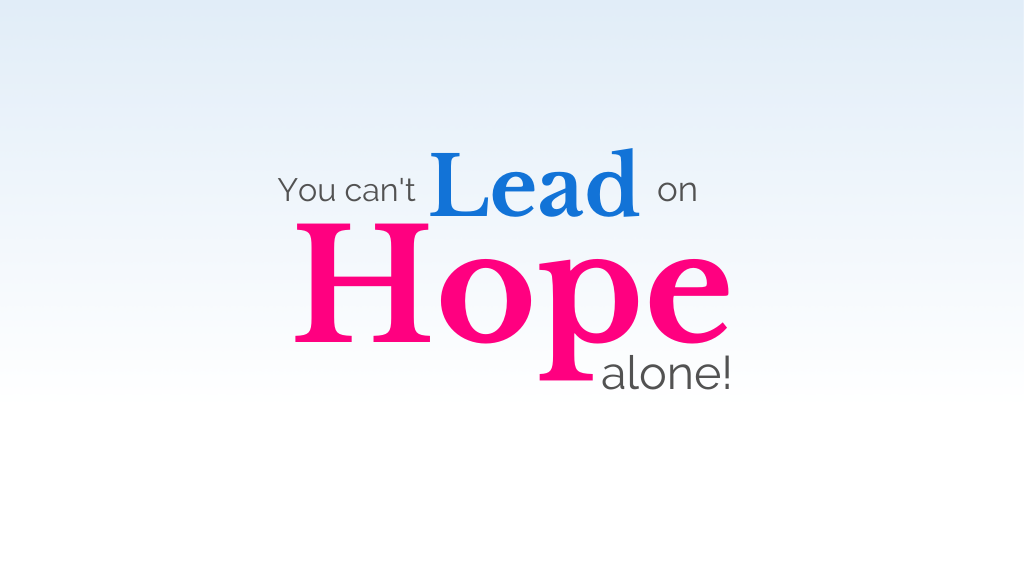In a recent coaching session, Annabel said to me, I just pray things will change. I pray “they'” will quit, so I don’t have to deal with them. Then, things can get back to normal.
I took a breath, then gently said:
Perhaps Annabel, instead of praying for someone else to do something, you could pray for help to be a better person, in fact, a better leader.
Annabel was quiet, but I could feel how incredulous she felt.
I continued, suggesting that instead of asking for a miracle like that person quits, that Annabel instead ask for help, support, guidance, strength, insights, and courage to be more patient, brave, direct, clear, inspiring, or motivating,
Again, Annabel was quiet, but this time, her quietness seemed open to hearing more, so I went on
I reminded her of the lesson we learned early in life, but rarely seem to heed: You can’t change anyone else. You can only change yourself.
Do you rely on hope?
Leaders often hope others will change. And hope alone is pretty useless.
Let me explain.
The dictionary defines hope as the feeling that what is wanted can be had or that events will turn out for the best. But that definition falls short. Hope also needs action.
Is hope one of your top character strengths?
I’ve often suggested to you to complete your Virtues in Action Signature Strengths test. If you have, you may have found, like me, that one of your top character strengths is hope. But let me share their description of hope as a character trait:
- Hope: “I am realistic and also full of optimism about the future, believing in my actions and feeling confident things will turn out well.”
- Realistic + Optimistic + Action-oriented + Confident thoughts = Hope
Most nonprofits live in crisis management mode
Most days, as a leader, things are less than perfect. Your team probably needs some work. The sector throws curve balls left and right. Clients and customers bring new challenges. As a result, you are left playing whack-a-mole, trying to decide what fire to put out first. But hoping tomorrow will be a better day, only goes so far.
You must MAKE tomorrow a better day. You can’t hope your way out of crisis mode!
You are probably saying, but Kathy, it’s not like I haven’t tried! True. You’ve probably tried very hard!
Here’s what to add to hope:
Here’s the thing though, it might be time to try something different. Instead of fixing your team, solving the problems, putting out fires, dealing with the crisis of the day, it might be time instead to focus on growing you!
Back to Annabel
Annabel’s plea, Dear God, please just fix things??is echoed across nonprofits every day! Her hope that things will change gets dampened day after day. And, if she’s not careful, her hope will turn to cynicism, bitterness and she will lose all faith that she can do much more than just survive each day.
I asked Annabel what kind of impact she wanted to have with her staff.
- Annabel said she wanted her staff to do what they were supposed to do, and on time would be nice!
- But more than that, she wanted them to get along, to support each other and be real team players.
When I asked what kind of a leader she would need to be to have that impact, Annabel was a bit stumped.
Annabel needs to focus on her growth
Perhaps I suggested that you would need to be a leader who inspired others and motivated them. I went on to talk about the traits of inspiring and motivating leaders such as compassion, patience, courage, fairness, humour, perspective, humility, the ability to self-regulate and to see things from different perspectives.
Annabel sighed. I don’t remember learning any of that in college.
Nope, they typically aren’t taught in your social work class, rehab degree, or when you got your fundraising certification.
That doesn’t mean you can’t learn them.
Do you have these same mistaken beliefs?
Where many leaders get caught up is these 3 mistaken beliefs:
- I don’t have time!
- I don’t know how!
- Soft skills don’t count.
Those points miss the mark.
You won’t find the time to work on yourself. You have to make the time
- hope + action
You don’t need to know how you need the willingness to figure out how
- growth mindset
Soft skills don’t just count. Soft skills ARE Leadership. Leadership isn’t doing things; Leadership is being the type of person who inspires and motivates people towards a future vision. That’s about the kind of person you are.
- your character
You need to develop a growth mindset
Being a strong leader starts with your mindset. It would help if you believed you could grow and learn.
Where many of us are, is stuck with a fixed mindset. I’ll never learn to address conflict. I can’t set boundaries. I’ll never be able to be organized enough to pull agendas together two days before staff meetings.
Your fixed mindset keeps you stuck where you are, hoping, but losing faith.
Remember, you need hope + action. That requires a growth mindset. Instead of being fixed and stuck, a growth mindset inspires you to figure it out.
When you have a growth mindset, you believe that with effort, time and hard work (and hope) that you can learn new skills and ways of being.
- Those that believe with their whole heart that they can learn do learn.
- Those that question their abilities, second guess themselves and doubt they can, will struggle.
Do this:
Notice your thoughts this week. How often do you say, pray or plea that something outside of you will change? When you do, flip it back to yourself and ask a question like this:
- In what way am I not being the person I’d like to be here? What can I do to change that?
- What type of person do I need to be to handle this situation with confidence?
- What do I need to learn so that I can inspire the behaviours I want from my team?
- What can I do to expand my thinking?
These kinds of questions will help you develop your growth mindset and enjoy impactful leadership. Learn more about how to adopt a growth mindset here
First published at https://www.kathyarcher.com/blog/leaders-need-more-than-hope


